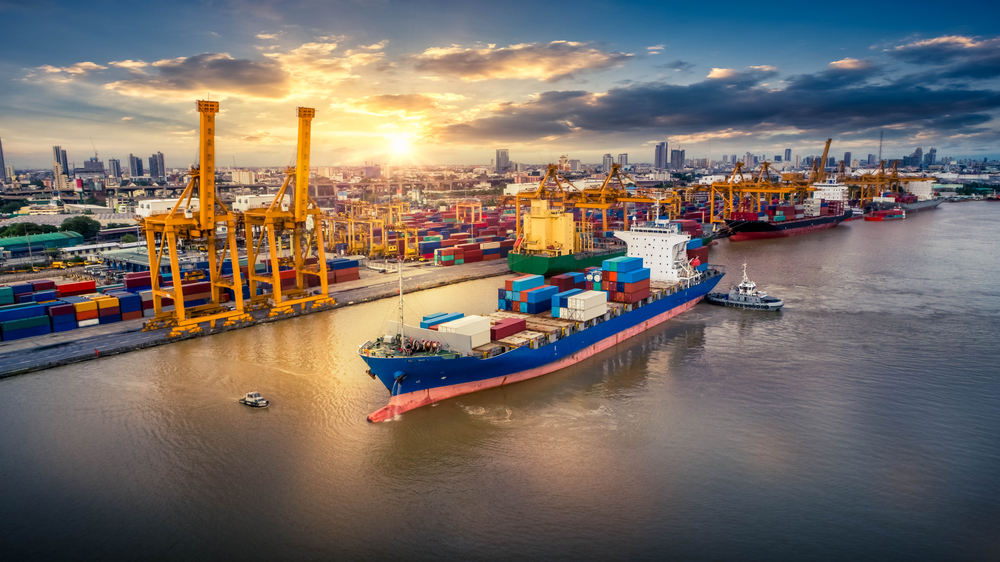
9 April 2025
Willem Sels
Global Chief Investment Officer, HSBC Global Private Banking
and Wealth
On 2 April, the US government announced the most historic tariff hikes since 1930’s Smoot-Hawley tariffs Act across almost all of its trading partners. Since then, global risk appetite has taken a hit across asset classes and geographies. Various countries are already planning to impose reciprocal tariffs on the US, increasing the risks of a global trade war.
Since 2 April, the S&P500 is down by 11%, while FTSE250 and EuroSTOXX have fallen by 7% and 12%, respectively. In Asia, Hang Seng Index has also corrected by 13%, at the time of writing. Risk-off sentiment is fuelling the demand for safe haven with safe haven bond yields falling.
While the correction in the early markets has made valuations a bit more attractive, analysts have only made mild downward revisions to their earnings forecasts so far. We expect more downward revisions as businesses provide negative guidance and see little scope for any convincing bounce.
The combination of tariffs and heightened uncertainty is expected to further slow down the global economy, and the US, in particular, as businesses and consumers will put a hold on their spending and investment decisions.
But while US equity sentiment has fallen, investor positioning has still not been reduced enough to provide a floor for markets. Hence, we expect the rotation out of the US to continue in the near term.
We believe the objectives of the tariffs include the creation or protection of US jobs, the wish to bring US borrowing costs down and get better access for US companies to foreign markets. These ambitious objectives suggest that the government is willing to go through a period of uncertainty before there is any substantial easing of the tariffs.
The impact of tariffs is expected to be higher in the US than in the rest of the world. This is because the broad-based tariffs on almost all trading partners do not provide US companies with any ‘cheap’ imports. As a result, either their margins will be compressed or inflation will be raised, hurting the consumer.
For now, the market expects a ‘transitory’ inflation spike and is happy to price in four Fed cuts this year, potentially starting in May. We think the Fed may choose to prioritise growth and financial stability concerns. As a result, government bond yields should come down further, aided as well by their safe haven appeal.
Asian countries are topping the list of the hardest hit by US tariffs. Open economies like Japan, South Korea, Vietnam and Thailand may be more vulnerable than others. Reciprocal plus auto tariffs will hit the earnings for auto markets in Japan and South Korea the most, while stimulus and domestic consumption should support China and India earnings against the tariff headwinds.

Source: Bloomberg, HSBC Global Private Banking and Wealth as of 8 April 2025. Past performance is not a reliable indicator of future performance.
While we see further downside for US stocks in the short term, we hold a neutral view on a 6-month horizon. Globally, our focus in equities is defensive, selective and focused on quality. We prefer services over goods, and companies with strong cash flows and brand names.
We maintain our relative preference for Asia, including China, India, Japan and Singapore due to their domestic resilience. Singapore and Inda stand out as safe havens to tariffs. Tech and domestic sectors including banking and consumption remain our pick in Japan, while the financials, healthcare and industrials sectors with a large-cap bias are our favourites in India. Inflation also remains well under control for the region, providing more room for Asian central banks to cut rates further, supporting growth ahead.
In China, we await tactical opportunities from mispricing caused by the tariffs to capture structural growth opportunities, focusing on AI enablers and adopters from the internet, ecommerce, software, smartphones, semiconductors, autonomous driving, and robotics. We also favour the consumption, financial and industrial leaders, as well as quality SOEs paying high dividends.
Exports to the US account for 25% of European companies’ revenues, but the impact of tariffs is substantially lower as much of this is related to services, and some of the goods sold are produced in the US. Also, we see Europe’s recent response to the tariffs more balanced in an effort to avoid escalations. However, we would be careful not to misread any announcements by the EU. European markets are trading at 65% discount to their US peers. Additionally, stimulus packages for defence and Germany’s infrastructure package have further added to the appeal.
The UK is in a relatively good spot with ‘only’ a 10% tariff and is already in close talks with the US to come to a trade agreement. By not retaliating, we think inflation pressures can be contained, helping to cap borrowing costs for the government and boosting gilt performance. At the same time, the UK is also looking at expanding its trade relation with other countries, like India. While we like UK and Eurozone equities, we maintain our neutral stance and are awaiting sentiment to stabilise before adding further.
Amid persistent volatility, we think safe haven assets including high quality bonds and gold should benefit. Multi-asset strategies can help us diversify across geographies and assets, while an active approach in fixed income can capture tactical opportunities as they arise.
While we keep an eye on how the governments across the world respond to the US tariffs, and how they focus on driving domestic growth through government stimulus and support, we remain optimistic that markets will rebound in the long term as the fundamentals around re-onshoring, AI innovation and energy security remain strong.





This document or video is prepared by The Hongkong and Shanghai Banking Corporation Limited (‘HBAP’), 1 Queen’s Road Central, Hong Kong. HBAP is incorporated in Hong Kong and is part of the HSBC Group. This document or video is distributed and/or made available, HSBC Bank (China) Company Limited, HSBC Bank (Singapore) Limited, HSBC Bank Middle East Limited (UAE), HSBC UK Bank Plc, HSBC Bank Malaysia Berhad (198401015221 (127776-V))/HSBC Amanah Malaysia Berhad (20080100642 1 (807705-X)), HSBC Bank (Taiwan) Limited, HSBC Bank plc, Jersey Branch, HSBC Bank plc, Guernsey Branch, HSBC Bank plc in the Isle of Man, HSBC Continental Europe, Greece, The Hongkong and Shanghai Banking Corporation Limited, India (HSBC India), HSBC Bank (Vietnam) Limited, PT Bank HSBC Indonesia (HBID), HSBC Bank (Uruguay) S.A. (HSBC Uruguay is authorised and oversought by Banco Central del Uruguay), HBAP Sri Lanka Branch, The Hongkong and Shanghai Banking Corporation Limited – Philippine Branch, HSBC Investment and Insurance Brokerage, Philippines Inc, and HSBC FinTech Services (Shanghai) Company Limited and HSBC Mexico, S.A. Multiple Banking Institution HSBC Financial Group (collectively, the “Distributors”) to their respective clients. This document or video is for general circulation and information purposes only.
The contents of this document or video may not be reproduced or further distributed to any person or entity, whether in whole or in part, for any purpose. This document or video must not be distributed in any jurisdiction where its distribution is unlawful. All non-authorised reproduction or use of this document or video will be the responsibility of the user and may lead to legal proceedings. The material contained in this document or video is for general information purposes only and does not constitute investment research or advice or a recommendation to buy or sell investments. Some of the statements contained in this document or video may be considered forward looking statements which provide current expectations or forecasts of future events. Such forward looking statements are not guarantees of future performance or events and involve risks and uncertainties. Actual results may differ materially from those described in such forward-looking statements as a result of various factors. HBAP and the Distributors do not undertake any obligation to update the forward-looking statements contained herein, or to update the reasons why actual results could differ from those projected in the forward-looking statements. This document or video has no contractual value and is not by any means intended as a solicitation, nor a recommendation for the purchase or sale of any financial instrument in any jurisdiction in which such an offer is not lawful. The views and opinions expressed are based on the HSBC Global Investment Committee at the time of preparation and are subject to change at any time. These views may not necessarily indicate HSBC Asset Management‘s current portfolios’ composition. Individual portfolios managed by HSBC Asset Management primarily reflect individual clients’ objectives, risk preferences, time horizon, and market liquidity.
The value of investments and the income from them can go down as well as up and investors may not get back the amount originally invested. Past performance contained in this document or video is not a reliable indicator of future performance whilst any forecasts, projections and simulations contained herein should not be relied upon as an indication of future results. Where overseas investments are held the rate of currency exchange may cause the value of such investments to go down as well as up. Investments in emerging markets are by their nature higher risk and potentially more volatile than those inherent in some established markets. Economies in emerging markets generally are heavily dependent upon international trade and, accordingly, have been and may continue to be affected adversely by trade barriers, exchange controls, managed adjustments in relative currency values and other protectionist measures imposed or negotiated by the countries with which they trade. These economies also have been and may continue to be affected adversely by economic conditions in the countries in which they trade. Investments are subject to market risks, read all investment related documents carefully.
This document or video provides a high-level overview of the recent economic environment and has been prepared for information purposes only. The views presented are those of HBAP and are based on HBAP’s global views and may not necessarily align with the Distributors’ local views. It has not been prepared in accordance with legal requirements designed to promote the independence of investment research and is not subject to any prohibition on dealing ahead of its dissemination. It is not intended to provide and should not be relied on for accounting, legal or tax advice. Before you make any investment decision, you may wish to consult an independent financial adviser. In the event that you choose not to seek advice from a financial adviser, you should carefully consider whether the investment product is suitable for you. You are advised to obtain appropriate professional advice where necessary.
The accuracy and/or completeness of any third-party information obtained from sources which we believe to be reliable might have not been independently verified, hence Customer must seek from several sources prior to making investment decision.
The following statement is only applicable to HSBC Mexico, S.A. Multiple Banking Institution HSBC Financial Group with regard to how the publication is distributed to its customers: This publication is distributed by Wealth Insights of HSBC México, and its objective is for informational purposes only and should not be interpreted as an offer or invitation to buy or sell any security related to financial instruments, investments or other financial product. This communication is not intended to contain an exhaustive description of the considerations that may be important in making a decision to make any change and/or modification to any product, and what is contained or reflected in this report does not constitute, and is not intended to constitute, nor should it be construed as advice, investment advice or a recommendation, offer or solicitation to buy or sell any service, product, security, merchandise, currency or any other asset.
Receiving parties should not consider this document as a substitute for their own judgment. The past performance of the securities or financial instruments mentioned herein is not necessarily indicative of future results. All information, as well as prices indicated, are subject to change without prior notice; Wealth Insights of HSBC Mexico is not obliged to update or keep it current or to give any notification in the event that the information presented here undergoes any update or change. The securities and investment products described herein may not be suitable for sale in all jurisdictions or may not be suitable for some categories of investors.
The information contained in this communication is derived from a variety of sources deemed reliable; however, its accuracy or completeness cannot be guaranteed. HSBC México will not be responsible for any loss or damage of any kind that may arise from transmission errors, inaccuracies, omissions, changes in market factors or conditions, or any other circumstance beyond the control of HSBC. Different HSBC legal entities may carry out distribution of Wealth Insights internationally in accordance with local regulatory requirements.
Important Information about the Hongkong and Shanghai Banking Corporation Limited, India (“HSBC India”)
HSBC India is a branch of The Hongkong and Shanghai Banking Corporation Limited. HSBC India is a distributor of mutual funds and referrer of investment products from third party entities registered and regulated in India. HSBC India does not distribute investment products to those persons who are either the citizens or residents of United States of America (USA), Canada or New Zealand or any other jurisdiction where such distribution would be contrary to law or regulation.
The following statement is only applicable to HSBC Bank (Taiwan) Limited with regard to how the publication is distributed to its customers: HSBC Bank (Taiwan) Limited (“the Bank”) shall fulfill the fiduciary duty act as a reasonable person once in exercising offering/conducting ordinary care in offering trust services/ business. However, the Bank disclaims any guarantee on the management or operation performance of the trust business.
The following statement is only applicable to PT Bank HSBC Indonesia (“HBID”): PT Bank HSBC Indonesia (“HBID”) is licensed and supervised by Indonesia Financial Services Authority (“OJK”). Customer must understand that historical performance does not guarantee future performance. Investment product that are offered in HBID is third party products, HBID is a selling agent for third party product such as Mutual Fund and Bonds. HBID and HSBC Group (HSBC Holdings Plc and its subsidiaries and associates company or any of its branches) does not guarantee the underlying investment, principal or return on customer investment. Investment in Mutual Funds and Bonds is not covered by the deposit insurance program of the Indonesian Deposit Insurance Corporation (LPS).
Important information on ESG and sustainable investing
Today we finance a number of industries that significantly contribute to greenhouse gas emissions. We have a strategy to help our customers to reduce their emissions and to reduce our own. For more information visit www.hsbc.com/sustainability.
In broad terms “ESG and sustainable investing” products include investment approaches or instruments which consider environmental, social, governance and/or other sustainability factors to varying degrees. Certain instruments we classify as sustainable may be in the process of changing to deliver sustainability outcomes. There is no guarantee that ESG and Sustainable investing products will produce returns similar to those which don’t consider these factors. ESG and Sustainable investing products may diverge from traditional market benchmarks. In addition, there is no standard definition of, or measurement criteria for, ESG and Sustainable investing or the impact of ESG and Sustainable investing products. ESG and Sustainable investing and related impact measurement criteria are (a) highly subjective and (b) may vary significantly across and within sectors.
HSBC may rely on measurement criteria devised and reported by third party providers or issuers. HSBC does not always conduct its own specific due diligence in relation to measurement criteria. There is no guarantee: (a) that the nature of the ESG / sustainability impact or measurement criteria of an investment will be aligned with any particular investor’s sustainability goals; or (b) that the stated level or target level of ESG / sustainability impact will be achieved. ESG and Sustainable investing is an evolving area and new regulations are being developed which will affect how investments can be categorised or labelled. An investment which is considered to fulfil sustainable criteria today may not meet those criteria at some point in the future.
THE CONTENTS OF THIS DOCUMENT OR VIDEO HAVE NOT BEEN REVIEWED BY ANY REGULATORY AUTHORITY IN HONG KONG OR ANY OTHER JURISDICTION. YOU ARE ADVISED TO EXERCISE CAUTION IN RELATION TO THE INVESTMENT AND THIS DOCUMENT OR VIDEO. IF YOU ARE IN DOUBT ABOUT ANY OF THE CONTENTS OF THIS DOCUMENT OR VIDEO, YOU SHOULD OBTAIN INDEPENDENT PROFESSIONAL ADVICE.
© Copyright 2025. The Hongkong and Shanghai Banking Corporation Limited, ALL RIGHTS RESERVED.
No part of this document or video may be reproduced, stored in a retrieval system, or transmitted, on any form or by any means, electronic, mechanical, photocopying, recording or otherwise, without the prior written permission of The Hongkong and Shanghai Banking Corporation Limited.